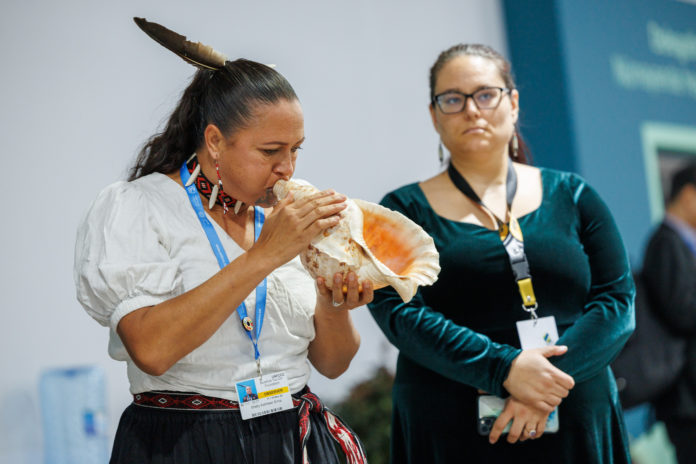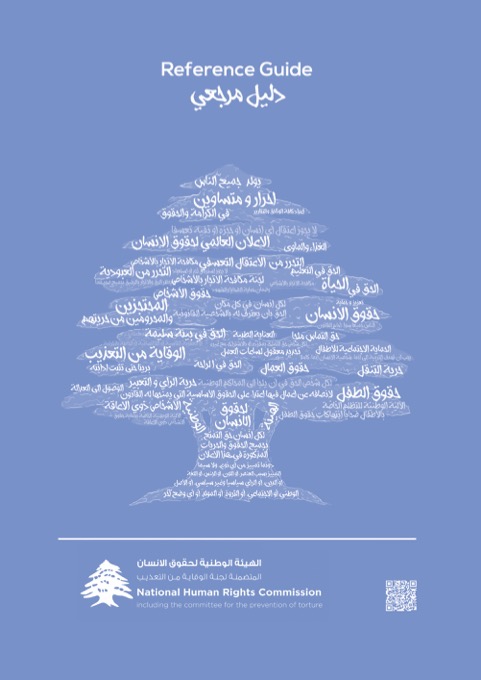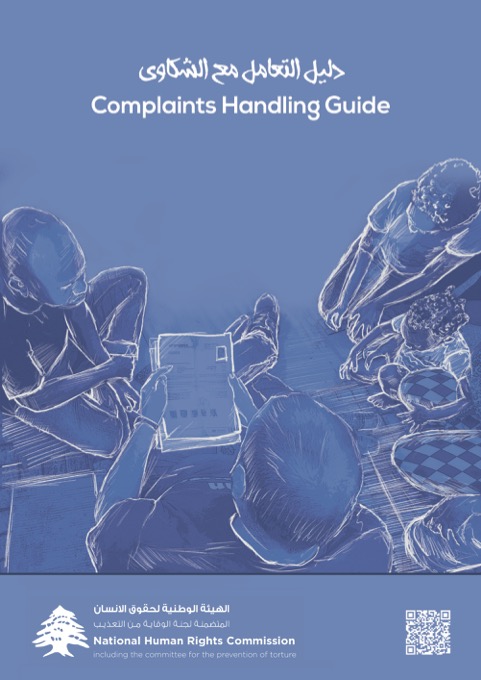هذه المقالة متاحة أيضًا بـ: العربية (Arabic)
From 11 to 22 November 2024, Azerbaijan is hosting the 29th Conference of the Parties (COP29) of the United Nations Framework Convention on Climate Change (UNFCCC) in Baku.
GANHRI released an open letter urging global leaders to make human rights central to climate action, calling for bold decisions that put people and human rights at the forefront.
Integrating Human Rights into the International Climate Negotiations:
GANHRI Open Letter to COP 29
Dear Heads of Delegation,
The Global Alliance of National Human Rights Institutions (GANHRI) and its member national human rights institutions from all regions have made consistent calls for States Parties to the United Nations Framework Convention on Climate Change (UNFCCC) and the Paris Agreement to integrate human rights into all aspects of their climate policy. National Human Rights Institutions (NHRIs) worldwide stand ready to support the translation of human rights- based obligations into commitments at COP 29 and action on the ground. GANHRI is the global alliance of 120 NHRIs with a broad constitutional or legal mandate to protect and promote human rights. As a response to the unparalleled human rights repercussions of climate change GANHRI members have pledged to promote human rights- based climate action through their monitoring, reporting, advisory and awareness-raising functions domestically, through their regional networks, and at the United Nations. GANHRI is a trusted partner of the UN; the Human Rights Council has recognised the role of NHRIs in connection with climate action in its resolution 51/31, and 2023’s UN General Assembly resolution on NHRIs reinforced the crucial role that NHRIs play in protecting and promoting human rights in the context of climate change. Climate change is one of the most urgent threats to humanity, impacting the lives of millions of people around the world. It is violating a range of human rights, including the rights to life, food, shelter, work, health, culture, water and sanitation, and development, as well as the right to a clean, healthy, and sustainable environment. It impacts disproportionately women, girls, youth, indigenous peoples, local communities, minorities, migrants, environmental human rights defenders, people on low incomes, older persons, and persons with disabilities, amongst others. In order to meet their human rights obligations, states must implement their commitments under the UNFCCC, the Paris Agreement, and other multilateral environmental agreements, and it is particularly important to respect, protect and promote the rights of all persons when taking action on climate change. A rule-based international order founded on human rights requires sustained political commitment to remain effective. This is especially important in addressing the climate crisis, which depends on the collective effort of all to reduce their national greenhouse gas emissions. The strength of the Paris Agreement depends upon its effective implementation, which itself hinges on the political and legal support it receives. GANHRI calls on states to uphold their obligations under the Paris Agreement and international human rights law. GANHRI calls on all states to be guided by their human rights obligations under international human rights treaties and consider the impact of climate change on groups with particular vulnerability when making commitments within the international climate framework and in all wider climate-related decision making.
As you convene at COP 29, we urge you to pursue the following actions to uphold human rights obligations in climate decision-making:
-
Prioritize Human Rights in Climate Finance Commitments
GANHRI calls on developed countries to fulfil their obligations under international climate and human rights agreements by establishing a New Collective Quantified Goal (NCQG) that truly reflects the needs of communities most affected by climate change. Climate finance commitments should specifically support mitigation, adaptation, and loss and damage in ways that are transparent and accountable, ensuring funds reach the communities that need them most. GANHRI also calls for a phase-out of fossil fuel subsidies, directing resources toward sustainable, rights-based solutions that protect and empower affected communities. NHRIs stand ready to collaborate with stakeholders to monitor and advocate for climate finance that translates into meaningful protections for those most at risk.
-
Increase Mitigation Commitments and Place Human Rights at the Centre of National Climate Goals
In order to limit the human rights impacts of climate change around the planet, it is essential to meet the goal of limiting global temperature increase to 1.5°C set out in the Paris Agreement. The world is facing a temperature increase of 2.6-3.1°C within this century. In order to avoid this, new pledges for Nationally Determined Contributions (NDCs) must increase ambition— and begin delivering on this ambition—immediately. Collectively, states need to reduce their annual greenhouse gas emissions by 42% by 2030 and 57% by 2035. As the February 2025 deadline for submitting revised NDCs approaches, there is an urgent need for Parties to set ambitious targets in line with these requirements. They must also ensure effective measures for implementation of NDCs towards a just and human rights-based transition. NDCs should prioritize the rights of communities most affected by climate impacts. This includes indigenous peoples, women, youth, older persons, local communities, and marginalized groups whose lives, livelihoods, and environments are at stake. NDCs must integrate clear, human rights-based commitments across all climate actions. Transparent safeguards are essential to ensure these actions protect and uplift affected communities. GANHRI urges Parties to work closely with NHRIs, whose mandate includes independent monitoring and advocacy, to ensure that human rights are safeguarded at every stage. NHRIs, together with civil society and impacted communities, should play an active role in the planning, implementation, and review of NDCs, guaranteeing that the voices and rights of those most affected are at the centre of climate policy.
-
Build a Fair, Human Rights-Centered Loss and Damage Fund
At COP 28 last year, Parties agreed to fully operationalise the Loss and Damage Fund (the Fund), designed to help vulnerable countries and communities to respond to the harm from climate change that goes beyond what can be adapted to ( For example, the loss of space and place due to sea level rise or slow onset events, along with the culture and
heritage that goes with it). GANHRI urges that this fund be governed by frameworks grounded in human rights, ensuring that funding reaches the communities most affected by climate change and that resources are allocated equitably and transparently. The Loss and Damage Fund must uphold the principles of accountability, inclusivity, and accessibility, with a particular focus on protecting the rights of groups with particular vulnerability.
-
Advance Adaptation that Protects All Communities
GANHRI emphasizes that effective adaptation to climate impacts is essential and a fundamental human rights obligation. Parties must implement the Global Goal on Adaptation in ways that uphold the rights of all, specifically groups with particular vulnerability who bear disproportionate impacts. Adaptation policies should directly address these specific needs, ensuring climate resilience efforts are inclusive and leave no one behind. National Adaptation Plans (NAPs) should integrate human rights principles through a country- driven, inclusive and participatory, gender-responsive, and locally led approach. GANHRI calls for the meaningful involvement of NHRIs, civil society, and impacted communities in the development, implementation, and review of these plans. This approach is vital to prevent rights violations, such as displacement or loss of livelihoods, and to ensure that any harm resulting from climate impacts is addressed with dignity and justice.
-
Ensure Safe Participation for Human Rights Defenders and All Voices
Public participation is essential to effective climate action and to safeguarding the human rights of those impacted by climate change. Human rights defenders—individuals and communities who advocate for environmental protection, climate justice, and human rights play a critical role in advancing these protections. NHRIs work to monitor and report on threats against defenders, provide support and protection, and advocate for laws and practices that ensure defenders can carry out their work safely. GANHRI calls on all Parties to COP 29 to recognize the rights of human rights defenders and commit to safe, open, and inclusive participation for all individuals advocating for climate justice. GANHRI further urges COP participants, the UNFCCC, and host countries to guarantee transparency in all agreements and to explicitly include human rights safeguards in Host Country agreements. NHRIs stand ready to collaborate with governments and civil society to secure a climate process that protects the civic space and the fundamental rights of all who advocate for a more just and sustainable world.
Conclusion
GANHRI encourages all states to support the efforts of independent monitoring bodies including NHRIs, as well as civil society organisations and members of the public to monitor, report on, and contribute to the human-rights based implementation at national level of commitments made at COP 29. This includes meaningful cooperation with such bodies, such as ensuring access to information and authorities and taking into due consideration their recommendations.
NHRIs, individually and collectively through GANHRI, will continue to monitor and report on human rights in the context of climate change, to inform and advise responses by national, regional, and international actors, and to map and raise awareness about efforts and good practices by NHRIs and civil society to respond to and mitigate challenges. GANHRI encourages States Parties towards bold and human rights guided decision-making at COP 29 towards the outcomes above. As NHRIs, we reiterate our willingness to work with States Parties, affected communities, civil society and other stakeholders for effective human rights-based action on climate change.


